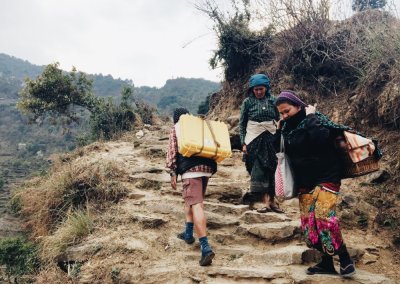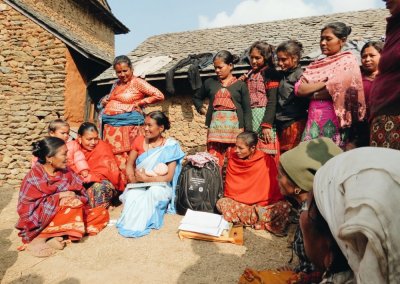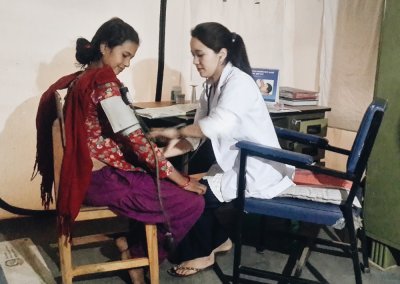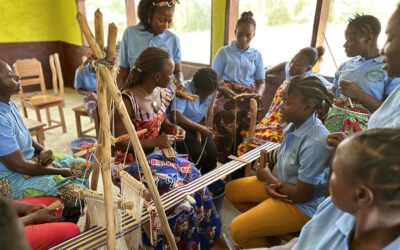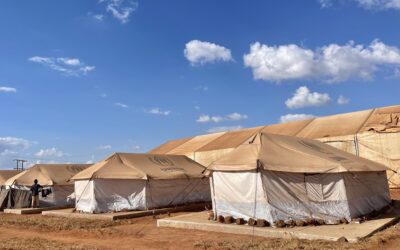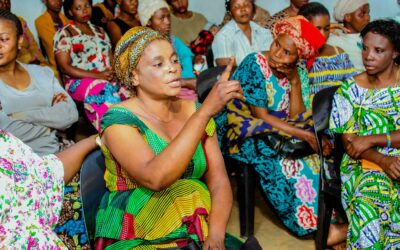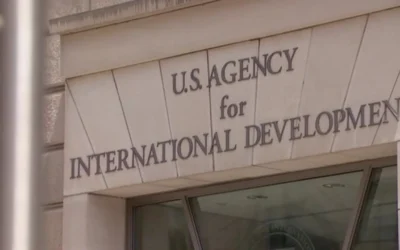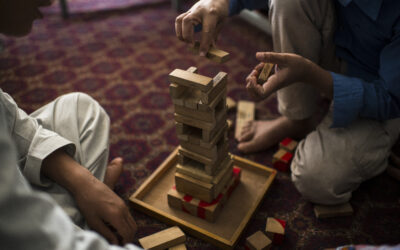Nepal: A Year After the Earthquake
In 2015, Nepal experienced a 7.8 magnitude earthquake that delivered multiple aftershocks and inflicted damage on almost half of the country’s districts. Over 8,000 people were killed in the quake, and thousands more were injured.
An earthquake of this size in a country like Nepal where extreme poverty hampers infrastructure, the impact is far worse, both in the tragic loss of life and in their ability to bounce back and rebuild in the years to come.
Health infrastructure was particularly hard hit, and an estimated 126,000 pregnant women were affected by this tragedy. A large number of maternal clinics were destroyed or sustained damage from the disaster. This destruction resulted in increased rates of unsafe and unsanitary deliveries, where many women were giving birth on streets because of the lack of access to clinics. And for the health workers who are available to these women, even they have a difficult time providing emergency services critical to mothers’ and babies’ survival because the nearest health facilities are days away, separated by massive mountains, rivers and impassable terrain.
ODW + One Heart World-Wide
Immediately after the earthquake, One Day’s Wages set out to provide emergency relief to those hardest hit by the earthquake in Nepal. We worked with our partners to provide lifesaving medical care, food, water and shelter.
But one of our core values is to continue supporting disaster-affected areas in the long-term, providing sustainable development to help families experiencing poverty improve their livelihoods. That’s why we’re coming alongside our partner One Heart World-Wide to improve the health of mothers in Nepal.
This project will train and equip 711 female community health volunteers with mobile health (mHealth) technology to communicate with the nearest health facilities about maternal care emergencies. By increasing the presence of skilled birthing attendants at birth and establishing an emergency notification system, we hope to prevent maternal and neonatal deaths for 7,000 pregnant women and their newborns.
Share this story: [shareaholic app=”share_buttons” id=”26108403″]
More stories of impact
Women at Work: Toward Inclusion in the Global Workforce
Can you remember the last time you couldn’t make it to work? Maybe your nanny canceled, and you were left without childcare. Or maybe your car battery died, and you didn’t have a safe way to get to the office. These are the kinds of barriers that women around the...
Standing in Solidarity When the World Turns Away
We cannot fix every broken system. But we can choose to stand in solidarity with those who cross our path. This choice, this posture of care and action, is what fuels us at One Day’s Wages. And it’s why we need each other, now more than ever. Recently, our Global...
Turning Challenges into Opportunities: Masoka’s Journey of Empowerment
Masoka’s hands are stained with the rich soil of the land she now calls home. A 37-year-old mother of four, she arrived at Dzaleka Refugee Camp in Malawi after fleeing the conflict in her home country, the Democratic Republic of the Congo. The future felt uncertain,...
What Was USAID, and What Now?
USAID has made news headlines constantly over the last few months. You may find yourself wondering: what is USAID, and is One Day’s Wages affected by its dismantling? As a global development organization, we at ODW care deeply about the people who depend on foreign...
Growing Love, One Drop at a Time: How One Woman Turned Her Birthday into a Gift of Clean Water
When Sara, a graphic designer and mother from Oregon, started thinking about how to celebrate her birthday, she decided to do something different—something meaningful. With a belief that “we are all connected… with the power to affect change by how we live our own...
Bridging the Gap: An Update on Our Response to the Funding Freeze
In Matoh, Cameroon, a mother prepares to give birth. Life in a conflict zone means getting to a safe facility with trained health workers is nearly impossible. Fortunately, a new mobile clinic begins offering prenatal care and transportation to a birthing clinic,...
LEARN
Leadership
Transparency
Read the Latest
Contact Us
COLLABORATE
Faith Groups
Schools
Businesses
Get Involved
One Day’s Wages exists to alleviate extreme poverty by investing in, amplifying, and coming alongside locally led organizations in underserved communities.
©2025 One Day's Wages is a registered 501(c)(3) organization | Tax ID #26-2566653 | Privacy policy | Terms of use
P.O. BOX 17575 Seattle, WA 98127 | Contact us

